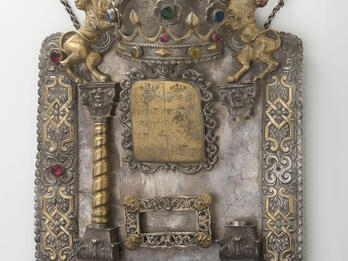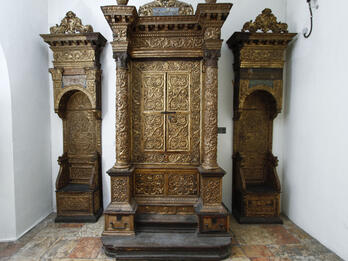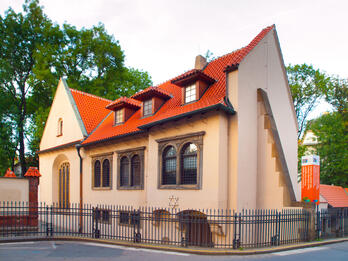Appointment of Isaiah Horowitz as Communal Rabbi
We have accepted upon ourselves the rabbi, aluf,1 the gaon, our teacher and master R. Isaiah ben R. Abraham ha-Levi, of blessed memory, to serve as our av bet din [head of the court] and rosh yeshiva [head of the yeshiva]. He shall be a moreh tsedek;2 may he teach?—he may teach; may he adjudicate?—he may adjudicate; may he rule that something is permitted?—he may rule that something is permitted [see b. Sanhedrin 5a]. In his hand shall be the rod of rulers [see Isaiah 14:5] and the staff of God [see e.g., Exodus 17:9], to establish the pillar of the Torah, and its statutes and judgments, and to punish the violator and to make him eat the fruit of his deeds [see Jeremiah 32:19], together with the members of the yeshiva, may their Rock protect and sustain them, and only if the two beadles agree with them.
However, regarding a monetary case between two individuals who agree to be judged by the av bet din or with those who join him, if the decision of the av bet din involves a declaration concerning a member of our town, or one of the other towns, such a declaration shall not be issued without the knowledge the officers and beadles of the other place, as they have their own reasons and justifications. The av bet din is not obliged to hear a case between two people for a sum of twenty gold coins or less; rather, the “beadle colleagues” are obligated to judge in such an instance.
Second, we have raised a collection in order to give to this av bet din two hundred gold coins in ready cash, good money that will be accepted in any autumn fair, as well as two hundred good gold coins that will be accepted in any spring fair, as reimbursement for his lost time, which is written in the contract of the rabbinate that applies every day. For the av bet din willingly accepted upon himself that he would be forbidden to derive benefit from even one penny that he accepts as reimbursement for lost time due to a halakhic ruling. This applies even if he arranged a compromise and even if he invested a great deal of effort and work into the case—both with regard to incidents that might occur here in our community and also cases from elsewhere that come before him here.
The av bet din also agreed with us, in light of the ordinations of our teacher, not to ordain teachers without the agreement of the members of the yeshiva, and even when their agreement is obtained, that man should not be granted the title of teacher unless permission is received from the beadles and the colleagues.
Concerning the law that “a Torah scholar may perform judgment for himself” [b. Mo‘ed Katan 17a], the av bet din has agreed that he will not impose a ban on any person who defies him, God forbid, without first convening the members of the yeshiva and the colleagues within three days, in order to execute the judgment properly.
It was also stipulated that the av bet din will not communicate with another authority or another court—in writing or orally—without the knowledge and consent of the holy council. This applies to all cases, public and private application alike. Now also the av bet din, in this way, in the community (may its Rock and Redeemer protect it) house [with the sign] tsur ekhel [“at the acorn”], with the knowledge of the honorable city council and councilors and previous rabbis (of blessed memory), has also to “sit” in court over this matter, that he and his wife and all their descendants, may they live, have a presumptive right to that house, with all its property. Likewise, others shall not perform on their behalf any deed or take any action to remove the house or its contents from the possession of the congregation (may its Rock and Redeemer protect it), and they shall deploy no deceit or underhand methods. Also, the head of the court (may his Rock and Redeemer protect him) shall not let anyone live in the house, without the permission and knowledge of the colleagues.
And since this av bet din (may his Rock and Redeemer protect him) wishes that his young son, Mr. Jacob, should marry a female burgher, this Jacob should apply for burghership, with the support of the community (may its Rock and Redeemer protect it), as other citizens do and register his marriage here according to his being inscribed [i.e., after he obtains citizenship]. And concerning his son-in-law, the colleague Faivish, and the latter’s wife, his [i.e., the rabbi’s] daughter Neḥamah (may she live), the congregation (may its Rock and Redeemer protect it) has the choice to provide expenses for her return to the holy congregation of Ostroh or make her a burgher like other citizens. So, also for the benefit of R. Faivish the community should offer help for the purpose of obtaining citizenship for him and if they do not make her a citizen she shall be returned to the holy congregation of Ostroh, at the congregation’s expense, as above.
Likewise, the honorable R. Isaiah, our teacher and master (may his Rock and Redeemer protect him), may we live and not die, requested that his wife, may she live not be rejected and be provided with a residence, the congregation (may its Rock and Redeemer protect it) promised him that it will provide her with a house and chamber all the days of her life, that she shall have a residence all the days of her life, may we live and not die.
With regard to all marriages that are held here, both those who have citizenship here and those who do not have citizenship here, his wages shall be two gold coins from both parties, and all documents required by the parties shall be written by them at their own expense. If the dowry of both parties is something between one thousand and two thousand gold coins, then both parties shall give four gold coins; if it is between two thousand and three thousand gold coins, the parties shall give five gold coins; from three thousand gold coins upward, they shall give seven gold coins [all these ranges are inclusive]. If the av bet din permits a divorce to one of the citizens of the state, his wages shall be two gold coins. In a case where a widow has to take an oath to receive payment of the sum of her marriage contract—if her marriage contract is less than one thousand gold coins, then the payment shall be six gold coins; from one thousand and upward, it shall be ten gold coins for the order. A quarter of a gold coin for the ratification of a document; and a quarter of a gold coin for hearing testimony—both once and on several occasions [ . . . ] two gold coins, and the rabbi shall take two for himself for his expenses. We have accepted all this upon ourselves together, for renown and for praise.
Isaiah, son of my master, my father and teacher, the honorable Abraham, the deputy Levite, Horowitz.
Notes
[Aluf is a title equivalent to “rabbi.”—Trans.]
[Moreh tsedek is an auxiliary town rabbi, who has the authority to issue halakhic rulings.—Trans.]
Credits
The Jewish Community of Frankfurt am Main, “Appointment of Isaiah Horowitz as Communal Rabbi” (manuscript, Frankfurt, 1606). Published in: Marcus Horovitz, Frankfurter Rabbinen, Vol. 1: Von R. Simon Haderschan bis R. Jesaia Halevi: 1200–1614 (Frankfurt: Commissionsverlag der Jaeger’schen Buchhandlung, 1882), pp. 58–60.
Published in: The Posen Library of Jewish Culture and Civilization, vol. 5.





